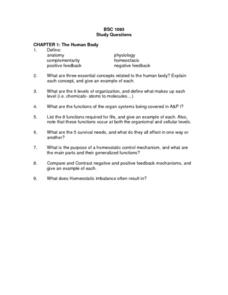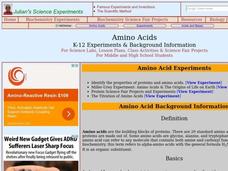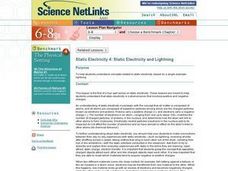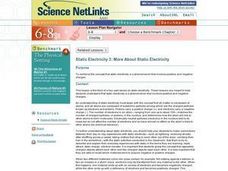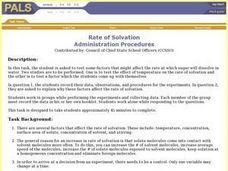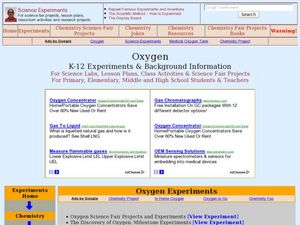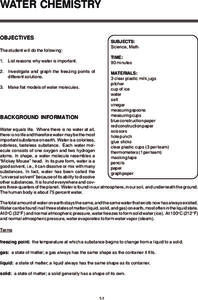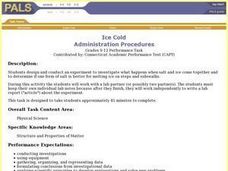Curated OER
The Human Body Study Questions
In this human body study question worksheet, students define 6 words associated with the human body. They answer 8 short answer questions about the organization and function of the organ systems and organization structure of the human body.
Curated OER
Physical and Chemical Properties of Water
Students experiment with water as a component of suspensions, solutions, and heat conduction contributing to the use of food and the health and wellness of human beings.
Curated OER
Amino Acids
Students explore what amino acids are, their history and how they are used in technology. In this protein lesson students identify the properties of proteins and amino acids.
Curated OER
Water and Ice
Students observe water as it changes form. For this water lesson students observe, measure, and describe water as it changes state.
Curated OER
Static Electricity 4: Static Electricity and Lightning
Students explain concepts related to static electricity, based on a single example: lightning.
Curated OER
Static Electricity 3: More About Static Electricity
Students reinforce the concept that static electricity is a phenomenon that involves positive and negative charges.
Curated OER
Electricity
Middle schoolers watch instructor present demonstrations of the basic principles of static electricity, and then conduct some of their own experiments. In small groups, students build simple circuits, using batteries, to try to light up...
Curated OER
Water and Ice
Learners examine water. In this chemistry lesson plan, student examine the physical properties of water and how it changes from a liquid to a solid or a gas. This lesson plan contains links to a second and third complimentary lesson plan...
Curated OER
Rate of Solvation
High schoolers test factors that may affect the rate at which sugar dissolve in water. They conduct two studies: One is to test the effect of temperature on the rate of solvation and the other is to test a factor which Students come up...
Curated OER
Solids, Liquids, and Gases
First graders explore the properties of matter. In this states of matter lesson plan, 1st graders conduct scientific investigations that require them to mix, cool, and heat objects in order to observe changes in the properties of matter.
Curated OER
DNA
Students explore the basics of DNA and its history. In this DNA lesson plan students extract DNA from fruits and understand how it is used in forensics.
Curated OER
Oxygen
Students explore oxygen and its physical and chemical propeties. In this investigative activity students complete several experiments using oxygen.
Curated OER
Ammonium Nitrate - Efficient Fertilizers
Students study the chemistry of ammonium nitrate and consider the advantages and disadvantages of this compound. They compare different fertilizers and calculate the molar mass and percent nitrogen in the different fertilizers.
Curated OER
How Are The Properties of Covalent Compounds Influenced By Chemical Bonding?
Students work together to observe the bond lengths of single, double and triple bonds. They make their own predictions about the strength of the bonds and chemical reactions. They answer discussion questions to complete the...
Curated OER
Nanofibers on Your Clothes
Learners relate the presence of nanofibers in clothing to its ability to repel stains. They observe and contrast the characteristics of nanofiber, Scotchguard treated, and regular fabric then test the stain resistance of each fabric...
Curated OER
Carbon Cycle
Students study the carbon cycle and how it cycles through our environment. In this carbon cycle lesson students play a game that allows them to discover that carbon can take many forms and that there is not a set path.
Curated OER
Chemical Bonding
For this chemical compounds worksheet, pupils review the different types of bonding, define the octet rule, and draw Lewis structures (electron-dot diagrams) for given compounds. This worksheet has 7 fill in the blank, 5 short answer...
Curated OER
Structural Changes in a Protein
Young scholars observe and manipulate the structure of a protein. They form an alpha helix, a beta sheet, and add disulfide bonds. They create a multimeric protein and compare their location with other students.
Curated OER
"Why Is the Sky Blue?"
Middle schoolers investigate why the sky is blue and the sunset is red. They are asked why do you think that we see the sky as blue? Students write a hypothesis on their "Blue Sky Lab Sheet". They explain why they think that the sky...
Curated OER
Combustion Reactions
Students write a balanced chemical reaction. They articulate how burning fossil fuels increase the carbon dioxide levels in the atmosphere. Students incorporate all the environmental risks involved as well.
Curated OER
Air and Water in the Environment
Second graders participate in a three part lesson in which they identify and describe forms of moisture in the environment. Part one of the lesson involves the three stages of the water cycle, part two focuses on creating humidity by...
Curated OER
WATER CHEMISTRY
Students list reasons why water is important and investigate and graph the freezing points of different solutions.
Curated OER
Ice Cold
Students design and conduct an experiment to investigate what happens when salt and ice come together and to determine if one form of salt is better for melting ice on steps and sidewalks.
Curated OER
Let Us Bond Together
Fourth graders paricipate in a demonstration about bond strengths and bond types.
